 October isn’t just a beautiful month; it is National Bullying Prevention Month. The purpose is to bring awareness and solutions to kids and schools. Most readers of this column are adults, so the focus of this article is adult bullies.
October isn’t just a beautiful month; it is National Bullying Prevention Month. The purpose is to bring awareness and solutions to kids and schools. Most readers of this column are adults, so the focus of this article is adult bullies.
Child bullies grow to be adult bullies. Why would they change? Bullying works for them; it gives them not just a feeling of power, but actual wins. Adult bullies are everywhere. They are in schools, offices, churches, government, sports, families, playgrounds, bedrooms, stores,
hospitals, airplanes; you name it.
What is a bully? Merriam-Webster’s definition: “a blustering, browbeating person. one who is habitually cruel, insulting, or threatening to others who are weaker, smaller, or in some way vulnerable.”
According to https://www.stopbullying.gov, there are two bully modes: Direct, when the victim is present and indirect when rumors are spread, including posts on social media. Bullying can be physical, verbal, relational, or damage to property. Bulling is wrong.
The first step, for young and old alike, is to be aware of bullying. When we feel afraid, voiceless, or tiny like a peanut on the floor, something is not right. Ask yourself, “What and who is causing me to feel like this? Who is benefiting at my expense?” Pay attention.
Bullies can be ruthless with no concern for how words or behavior hurts others. They don’t care. They are only interested in how it benefits their ego or boosts their low self-esteem. Bullies are not self-confident. People bully to cover up their inadequacies.
What can YOU do?
1) Don’t be a bully. You know if you are powering down on someone. Just stop and think of another way to be heard or to feel important. Stop saying nasty words, putting others down, hitting, kicking, pushing, yelling, talking over, and threatening. Don’t Do It. Be a good human.
2) Stop laughing and cheering bullying behavior. People often laugh when they don’t know what else to do, or they support the bully for fear of retaliation. Remember, bulling is not cool; it is wrong. It causes hurt and lasting damage. Abusiveness helps the bully feel significant and
vital, but that doesn’t make it right. The end does not justify the means. People who support and encourage bullies contribute to the overall negative consequences. Don’t be a bully’s side-kick; you will likely get blamed for his or her behavior when accusations are denied, or you could become the next victim.
Bullies are not in the healthy range of mental or emotional wellness, and they adversely damage the mental wellbeing of those subjected to their abuse. If you are a bully, learn a healthier way. If you support and encourage a bully by laughing, cheering them on, or participating, stop.
Be a good human—you will like yourself better, and that, my friend, is essential to good mental health.
Until the next time: Live while you live.
Powered by WPeMatico